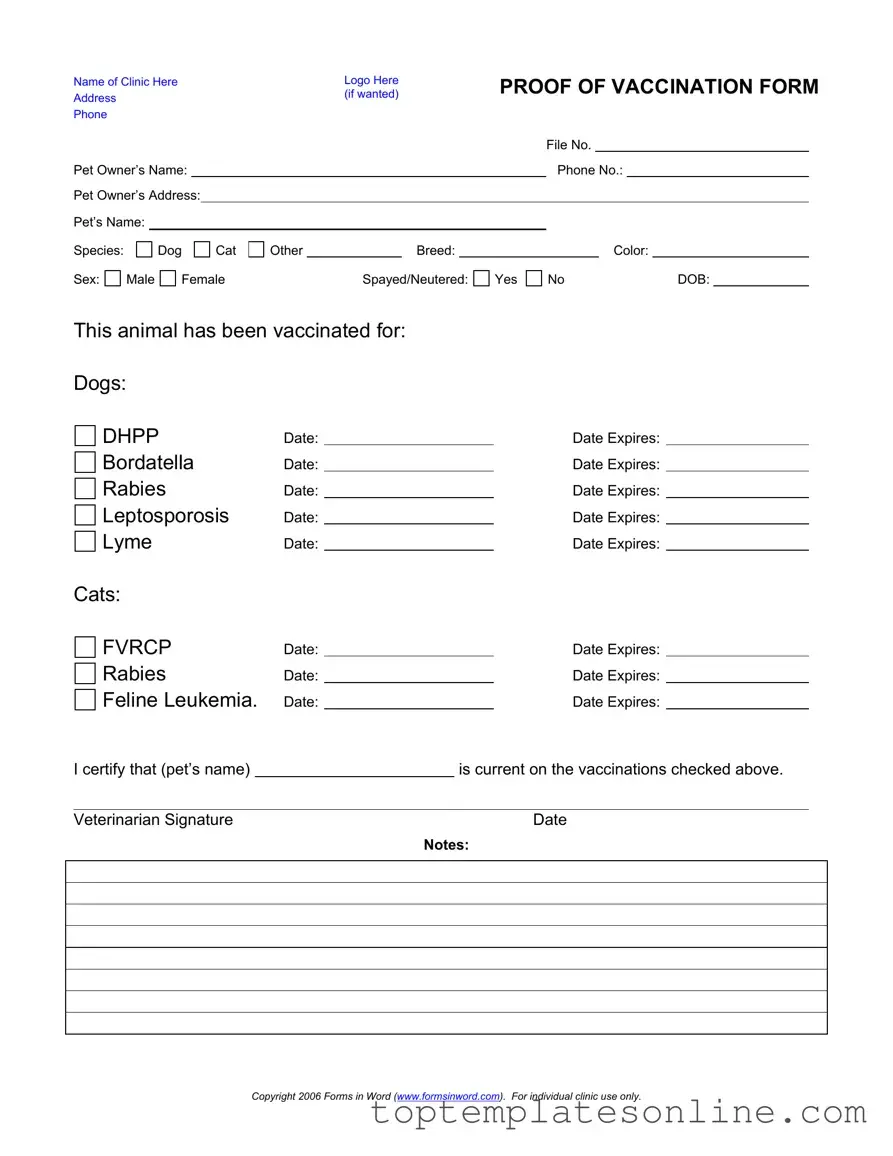Fillable Proof Of Vaccination Dog Form
The Proof of Vaccination Dog form is an essential document for pet owners, ensuring that their dogs are up-to-date on required vaccinations. This form typically includes the name of the veterinary clinic, its logo, and contact information, making it easy for pet owners to identify where their pet received care. Key details about the pet owner and their dog, such as the owner's name, phone number, and address, are included alongside the pet's name, breed, color, and sex. The form also specifies whether the dog has been spayed or neutered and includes the date of birth. Most importantly, it lists the vaccinations administered, such as DHPP, Bordetella, Rabies, Leptospirosis, and Lyme, along with their respective dates and expiration dates. A veterinarian's signature confirms that the information is accurate and that the dog is current on its vaccinations. This form not only serves as proof of vaccination but also helps maintain the health and safety of dogs in the community.
Common PDF Templates
Ds-11 Passport Form - The DS-11 form is used to apply for a U.S. passport for the first time.
96 Well Plate Diagram - This versatile form is also suitable for cell culture applications.
This form is essential for any parent or guardian, as it provides peace of mind knowing that trusted individuals can step in during unforeseen circumstances, ensuring that your child's well-being is prioritized. For more information and to access the necessary documentation, you can visit the Florida Forms.
Puppy Health Guarantee Template - Buyers must agree to continue the puppy’s health care by maintaining vaccinations and routine veterinary checks.
Common mistakes
-
Leaving the pet owner’s name blank. This is crucial for identifying who owns the pet.
-
Not providing a contact phone number. This makes it difficult for the clinic to reach you if needed.
-
Failing to fill in the pet’s name. Without this, the vaccination record cannot be linked to the correct animal.
-
Choosing the wrong species. Make sure to select “Dog” if that is your pet.
-
Forgetting to indicate the breed. This detail helps in identifying your pet accurately.
-
Not specifying the color of your pet. This can lead to confusion, especially with similar-looking breeds.
-
Omitting the date of birth (DOB). This information is important for vaccination schedules.
-
Neglecting to check the vaccination status for each required vaccine. Ensure all applicable boxes are checked.
-
Not obtaining a veterinarian's signature. This signature validates the vaccination information provided.
Guide to Writing Proof Of Vaccination Dog
Completing the Proof of Vaccination Dog form is a straightforward process that ensures your pet's vaccination records are accurately documented. Follow these steps carefully to fill out the form correctly.
- Begin by entering the Name of the Clinic at the top of the form.
- If desired, include the Address of the clinic.
- Provide the clinic's Phone Number.
- Fill in the Pet Owner’s Name.
- Enter the Phone Number of the pet owner.
- Complete the Pet Owner’s Address.
- Write your pet’s Name in the designated space.
- Select the Species of your pet by marking the appropriate box (Dog, Cat, Other).
- Indicate your pet’s Breed.
- Fill in your pet’s Color.
- Select your pet’s Sex (Male or Female).
- Indicate if your pet is Spayed/Neutered by marking Yes or No.
- Provide your pet’s Date of Birth (DOB).
- For each vaccination your dog has received, check the appropriate box (DHPP, Bordatella, Rabies, Leptosporosis, Lyme).
- Next to each vaccination, enter the Date it was administered and the Date Expires.
- At the bottom of the form, certify that your pet is current on the vaccinations by signing your name as the veterinarian.
- Finally, write the Date of signing.
Once the form is completed, review it for accuracy before submission. This ensures that all information is correct and up-to-date, helping to maintain your pet's health records effectively.
Documents used along the form
When obtaining a Proof of Vaccination Dog form, several other documents may also be necessary to ensure compliance with local regulations and to provide comprehensive information about your pet's health. Below are some commonly used forms and documents that pet owners should consider.
- Veterinary Health Certificate: This document verifies that a pet is healthy and free from contagious diseases. It is often required for travel or boarding and must be signed by a licensed veterinarian.
- Rabies Certificate: Specifically documenting a dog’s rabies vaccination, this certificate is crucial for compliance with state and local laws. It usually includes details about the vaccine's manufacturer and expiration date.
- Pet Registration Form: Some municipalities require pet owners to register their dogs. This form typically includes the pet's information and owner details, helping local authorities keep track of pets in the area.
- Texas Certificate of Insurance: To maintain compliance with Texas regulations, Master Plumbers should ensure they have their Texas Certificate of Insurance filled out accurately. More information can be found at texasformspdf.com.
- Microchip Registration: If a pet is microchipped, this document contains the pet's microchip number and owner information. It is essential for recovering lost pets and may be required by some shelters.
- Pet Insurance Policy: While not mandatory, having a pet insurance policy can provide financial protection against unexpected veterinary costs. This document outlines the coverage and terms of the insurance.
- Travel Health Certificate: For pets traveling across state lines or internationally, this certificate may be necessary. It confirms that the pet meets health requirements set by the destination location.
Having these documents in order not only facilitates smoother interactions with veterinarians and boarding facilities but also ensures compliance with local regulations. Pet owners should keep copies of all relevant paperwork to safeguard their pet's health and well-being.
